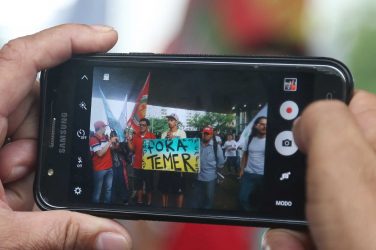Brazilian President Luis Inácio Lula da Silva urged countries to “work towards an economy less dependant on fossil fuels” during the COP28 climate talks that just ended with a deal to transition away from oil and natural gas.
But hours after the deal was struck, his government put up for auction a record 603 gas and oil drilling concessions covering 2% of the country’s area, according to an analysis by environmental nonprofit Arayara International Institute.
As industry executives entered a beachside hotel in Rio de Janeiro to present bids for energy fields that could produce up to 1 gigaton of carbon dioxide equivalent, according to Arayara data, there were protests outside by climate and Indigenous activists and representatives of “quilombola” descendants of enslaved Africans.
They said the auction was at odds with Lula’s pledge to reach net-zero deforestation by 2030 while protecting Indigenous and “quilombola” communities, whose land rights overlap key natural areas in the country.
“Don’t make a speech saying that your heart is concerned with your people … when in fact conservation units, coastal regions are going to be affected by this immense auction,” said Kretã Kaingang, coordinator at Apib, Brazil’s largest Indigenous umbrella organization.
Speaking to bidders at the hotel before the auction, Rodolfo Saboia, head of the Brazilian National Agency for Petroleum, Natural Gas and Biofuels, the country’s oil regulatory body, played down such criticism.
He said paralyzing domestic oil activities would only make Brazil “poorer and more dependant from other countries”.
By the end of the day, companies including Shell, Chevron and Petrobras had acquired 32% of the concessions up for grabs, the government agency said.
Conflicting pressures
Criticism of the auction highlights conflicting pressures on Lula’s government as it tries to balance efforts to boost the economy, jobs and incomes with pledges to protect nature and Indigenous communities, and be seen as leader in action on climate change.
Of the 192 concessions where drilling rights were sold, two sit on conservation areas and 131 on areas prioritized for conservation under government plans, and three put Indigenous territories at risk, according to the Arayara assessment.
Five of the blocks lie in the Amazon rainforest, which Lula has vowed to protect.
All of the areas would need environmental approvals to enter production, which could take years, but the auction has fueled activists’ concerns about Brazil’s commitment to pulling the plug on fossil fuels anytime soon.
They have also criticized Brazil’s decision to join the OPEC+ group of oil-producing nations as an observer, a move Lula said would allow Brazil to urge rich oil countries to finance renewable energy projects in poorer nations.
That came months after Brazil rebuffed a campaign by Colombian President Gustavo Petro to end new oil development in the Amazon as Brazil weighs whether to develop a potentially huge offshore oil find near the mouth of the Amazon River.
In August, the government announced that two-thirds of 540.3 billion reais (US$ 110 billion) in planned infrastructure investments for “transition and energy security” would be spent in the oil and gas sector.
And in March, Brazil’s energy ministry said it wanted the country to become the world’s fourth-biggest oil exporter, up from ninth at the moment.
But part of the fossil fuel push is for domestic consumption – as drought limits the country’s reliance on hydroelectric power, a key energy source.
“With climate change and droughts we’ve had to increase the percentage of energy generated from fossil gas”, said Nicole Oliveira, executive director at Arayara.
But she said new investments in fossil fuels made little sense when government projections predict that oil consumption will peak in 2030.
“We will be expanding production as demand drops,” she said.
Andre Cabette Fabio is Climate and Nature Correspondent for the Thomson Reuters Foundation based in Rio de Janeiro.
This article was produced by the Thomson Reuters Foundation. Visit them at https://www.context.news/





